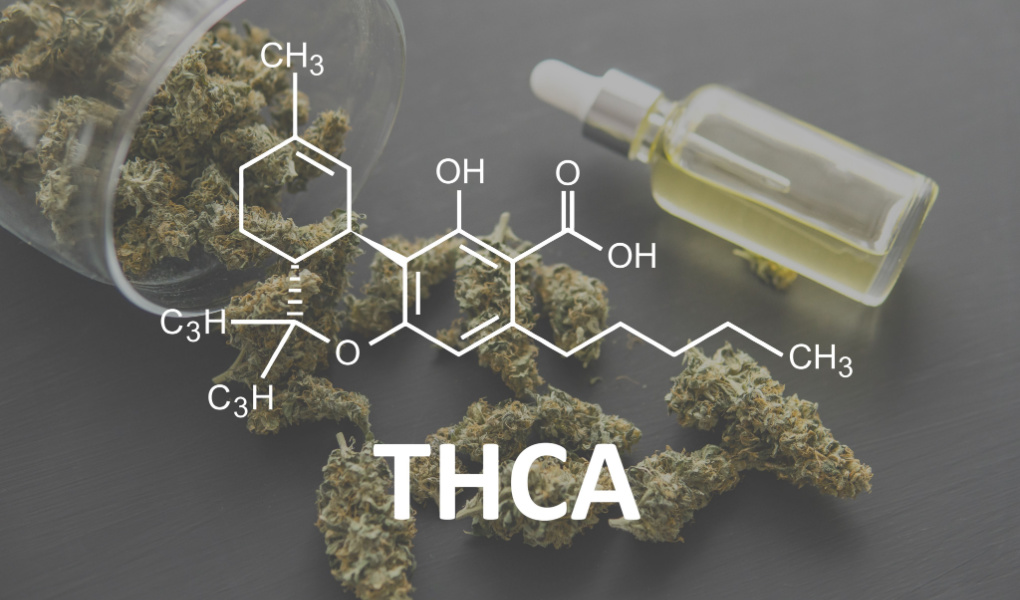
06 Feb WHAT IS THCA AND HOW IS IT DIFFERENT FROM THC?
While THC is by far the most popular and well-investigated cannabinoid because of its psychoactive buildings, it would not exist without its progenitor THCA. So what is the distinction between THC and THCA, and why aren’t there more developments on THCA?
WHAT IS THCA?
THCA means tetrahydrocannabinolic acid THC (tetrahydrocannabinol). When Marijuana expands, it forms cannabinoids as carboxylic acids that convert into non-acidic compounds with decarboxylation. Nearly all cannabinoids start in their acidic type, which has different structures and effects than their non-acidic versions.
THCA, although cannabis is unpredictable under-regulated storage conditions, and when exposed to light and warmth, readily decarboxylates into THC. One THCA research discovered that “THCA decarboxylates even when kept in between 4 and also 18ºC so THC contamination in THCA is nearly inevitable.” This THC contamination also among pure extracts determines lab outcomes based on THCA.
WHAT DOES THCA DO?
THCA is thought about as non-psychoactive significance. You do not experience a “high” when drinking it. THCA research study has shown that THCA does not appear to bind much to either cannabinoid receptor.
However, we can verify that essences mostly made up of THCA have been understood to have anti-inflammatory and neuroprotective structures. THCA has likewise been revealed to reduce nausea and vomiting.
HOW TO TAKE THCA?
When smoking marijuana, you are decarboxylating it, transforming the THCA into regular THC. This means that to take in THCA, you can ingest raw Marijuana. Numerous concentrates are suggested for dabbing. They are marketed as high in THCA and will convert with time into THC depending on how much light and temperature heat it is subjected to.
THCA vs. THC: decarboxylation procedure

Although the most typical decarboxylation process includes toasting Marijuana in the stove to convert THCA right into THC. There are numerous ways that weed can be decarboxylated.
Sunlight. THCA transforms to THC in varying levels through direct exposure to heat or light. Suppose a cannabis plant sits in the cozy sunlight for a prolonged period. In that case, its THCA particles will slowly convert to THC.
Room-temperature. THCA converts to THC when saved at an area temperature level long enough. When immersed in olive oil, 22% of THCA will transform over 10 days at 77 degrees Fahrenheit (25 degrees Celsius). Under the same conditions, 67% will convert when immersed in ethanol. With time, cannabis saved at room temperature with light exposure will transform 20% of its THCA into THC. Profits: THCA is unsteady and can convert to THC gradually with little intervention.
Smoking. A high level of heat is used and quickly transforms THCA into THC. However, not all THCA will convert. Although smoking is one of the most typical means to appreciate THC’s impacts, it’s not the most effective.
Evaporating. This is among the most effective means of evaporator Marijuana. When heated at a reasonably reduced temperature, the cannabinoid acids are transformed. Remaining to raise the warmth will make sure that the optimum quantity of THCA is converted into THC, but just to a point. THC’s ideal vaping temp is 315 levels F (157 C); going beyond that might be much better for some cannabinoids and terpenes (weed’s flavor representatives). Still, you’ll lose THC as temperatures climb.
Making use of vape pens. Decarboxylated cannabis distillate is more reliable than evaporating flowers. Since the THCA is already mostly converted to THC and the evaporation looks after a lot more, this is an effective technique for taking in intoxicating Marijuana. Buy reputable vape pens from certified brand names and dispensaries to ensure the marijuana oil within consists of no dangerous components.
Dabbing. Comparable to evaporation, dabbing THCA likewise right into active THC. Crystalline is the form of THCA probably to be made use of for swabbing. It has little taste or fragrance, as most cannabis removals intend to strip away the terpenes and also flavonoids to isolate the cannabinoids. But many manufacturers reintroduce cannabis-derived terpene mixes back into the concentrate. Not the addition of terpenes enhances the flavor. Still, these distinctively fragrant plant particles additionally interact with cannabinoids to generate entourage impacts that improve the healing possibility of Marijuana.
Cooking. You’ll want to decarboxylate the weed for intoxicating homemade edibles before instilling it in butter or oil. You can also use your stove to do it. Just grind your weed, spread it evenly across a cooking sheet lined with parchment paper, and bake at 230 degrees Fahrenheit (110 degrees Celsius) for 30-45 mins. This procedure will transform the majority of the THCA right into THC.
Whether cannabis is smoked, consumed, vaped, or juiced. Understanding the plant’s buildings and how they communicate with our bodies is critical in accomplishing the desired impacts and preventing adverse effects. Marijuana molecules each have benefits, and much more research is needed to comprehend the full range of what they might use.


Sorry, the comment form is closed at this time.